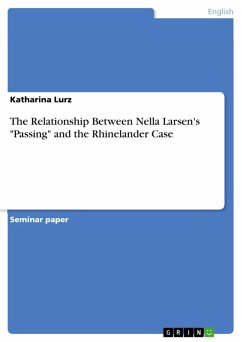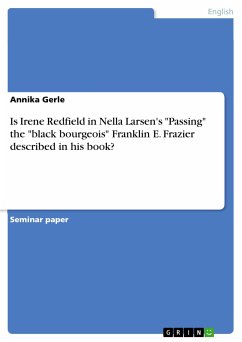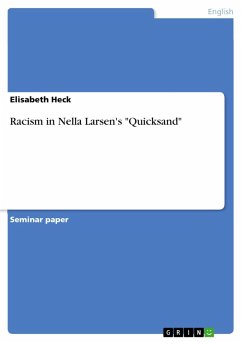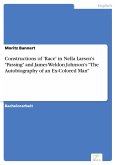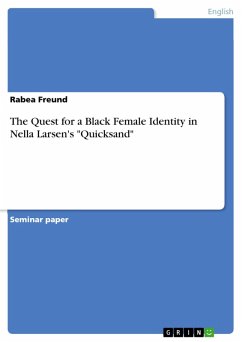Seminar paper from the year 2015 in the subject English Language and Literature Studies - Culture and Applied Geography, grade: 2,7, University of Bonn, language: English, abstract: Passing by Nella Larsen, published in 1929, features the issue of racial passing in a society which segregates people of Negro descent from the dominant white American class. Wall claims that "Not only is Passing set in Harlem at the height of its vogue, it is itself a product of the vogue. Aptly then, it acknowledges the opportunities as well as the risks that the more fluid racial and cultural boundaries of the period created". Irene Redfield, one of the two female protagonists, is able to pass, but still chose a life within Harlem and a coloured husband. Her counterpart Clare Kendry, on the contrary, is completely passing by being married to a white man who does not know about her descent. Still, she is highly fascinated by the life Irene leads in Harlem and thus she attempts at leading a double-life. As Clare becomes increasingly involved in the black culture of that time, she also has to fear about her husband finding out the truth about her. In order to set the issue of racial passing in a historical and cultural framework, I attempt at focusing on the connection between the novel and a jurisdictional case from 1925, called the Rhinelander Case. This case is also being referred to in Passing: "What if Bellew should divorce Clare? Could he? There was the Rhinelander case". Furthermore, Madigan claims the following: "That Larsen has the case enter Irene's mind so quickly, however, testifies to the Rhinelanders' importance to discussions of miscegenation, the law, and racial passing during the period of the Harlem Renaissance". Leonard Kip Rhinelander, who was from the upper white class of New York, got married to Alice Jones, who was mixed-raced and from the working class. Rhinelander attempted at annulling the marriage as he claimed he had not known about his wife's race before the wedding. She countered by claiming that he has known about their race before their marriage as it was unmistakable. The jury the young couple had to face was all-male and white. Thereupon, this term paper will deal with the following research question: How can the relationship between the Rhinelander Case and Nella Larsen's Passing be defined and which are the means by which this relationship is being constituted?
Dieser Download kann aus rechtlichen Gründen nur mit Rechnungsadresse in A, B, BG, CY, CZ, D, DK, EW, E, FIN, F, GR, HR, H, IRL, I, LT, L, LR, M, NL, PL, P, R, S, SLO, SK ausgeliefert werden.

